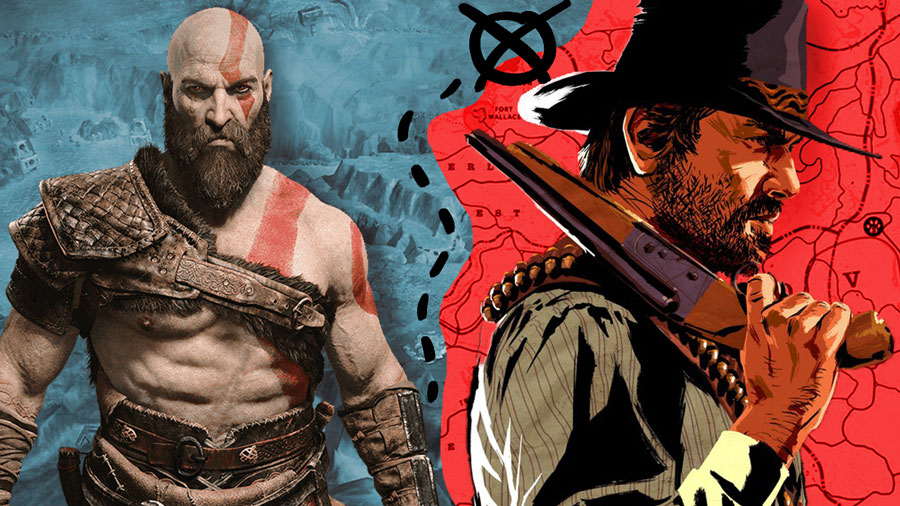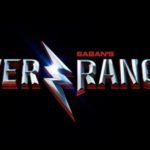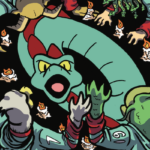
After about 70 hours with Red Dead Redemption 2, the 3000+ name, nearly 35 minute long credits rolled. Sitting back and expelling a big sigh of relief, I set my controller down. I was torn and figured out why. Red Dead Redemption was one of my favorite games of the last gen, without a doubt. With an eclectic cast of characters, an underused setting, and a heart-wrenchingly memorable ending to top it off. It stuck with me.
Eight years later, and Red Dead Redemption 2 comes sauntering over. It blows both Saloon doors clean off its hinges in its task to fully realize a Wild West open world. What’s frustrating is at what point does too much reality become a bad thing? A lot of games are praised for their realistic graphics, which RDR2 certainly has no problem showing off (at times), but what happens when that realism stretches into almost every facet of the game? It’s in these attempts to create immersion with some clunky decisions that the game effectively shoots itself in the boot at times, ultimately hurting its chances at Game of the Year.
In a year full of outstanding gaming experiences, most would say that there are two clear standouts. One is Red Dead Redemption 2 of course. Despite what the Golden Joystick Awards may lead you to believe, the other is not Fortnite (though it has contributed to the multiplayer landscape). It’s undeniably the grandiose father-and-son tale, God of War.
With meticulously crafted worlds, brimming with texture and lived-in environments rarely rivaled, they each handle their expansiveness in different ways. Red Dead hands you a giant map to unveil over the course of the game as you complete quests, transforming Arthur Morgan into a conflicted hero or dastardly criminal. God of War funnels you into an ancient hub, then asks you to venture off to its most forgotten corners. In GOW, the environments influence the storytelling and vice versa. Wherever Kratos and Atreus go is important, not just to the mission at hand but to understand the mythos. Each realm tells a different story and within them, smaller stories. In RDR2, the map is open to roam, and your only “hub” of sorts is a moving camp. You discover much smaller personal stories of strangers along the way. On a fundamental level, why do these games feel so different outside of the obvious? For me, it all comes down to the map and how players interact with it.
God of War does something respectable with its world in that it takes cues from Metroidvania style games, putting strange doors, chests, and puzzles everywhere. This starts quite early on and makes revisiting old locations not just rewarding, but exciting. It’s also relatively easy to get anywhere with its mystic gateway system. So if you do remember something from a previous part that you can open, it’s a quick journey to reach it. Red Dead Redemption 2 almost seems to want to fight that convenience to hold onto some sort of old world integrity. Unfortunately, it doesn’t make for much fun. Now there is a fast travel system in Red Dead, but it’s only through wagon rides at certain locations and your camp… once you pay in-game money to unlock it. If you’re just out riding the plains, you better look for the closest signpost on the map index or hope your camp is nearby. Otherwise, you’re often forced to ride long distances. Let me tell ya, there are only so many times you can save a poor soul from the clutches of a bear trap before you just wanna get to the objective. So, you get very familiar with the cinematic mode in this game; a way for you to take your hands off the controller when riding your horse from location to location. Warm take: a 60-hour game shouldn’t have 20 hours of watching your character ride his horse to the next event. It’s arguably the biggest reason why Red Dead Redemption 2 starts to feel exhausting in the final few chapters. Did I mention that cinematic mode often leads to trouble anyway?
https://www.youtube.com/watch?v=foKlsT1D26s
I watch a lot of Western films. I’m quite familiar with the slow-burn pace many of them tightly hold. However, I don’t play video games for that kind of experience. Especially one that isn’t over in the span of 2 hours like most films. Many of the missions in RDR2 are exciting and an absolute blast to play. It’s more of all the stuff between and around those where some dated game mechanics show their rust. I’m aware that may have been Rockstar’s intention with some of the mechanics at play, like the fact you can only carry the guns you remember to take off your horse. I get it. Realistically, you couldn’t carry an arsenal like Doom Guy… but at the end of the day how is that adding to the overall experience?
Problems with this even bleed over to the multiplayer. Red Dead Online opened its doors to all players last Friday and it baffles me that fast traveling still costs in-game money online–between $3-8 for most trips. This only brings to light the broken economy of the beta right now. You only earn between $2-5 for each online match. Each of these takes about 10 minutes. Guns in single player can be up to $1000. That’s one serious grind.
I’m hard on Red Dead Redemption 2 because it’s a series I adore. Despite its faults, it’s still one of the best games I’ve played this year. However, The Adventures of Kratos & Boy (my personal alternate title) delivered a much tighter and consistently engaging experience. I’ll be rooting for both of these games when The Game Awards airs on December 6th, but I know which one deserves it–100 work weeks aside.



